By M. Thomas Nast and Frankie Pressman
NYC Council Member Kamillah Hanks, already facing multiple controversies, is now linked to a scandal involving drug money after the recent arrest of David Mazzei, son of indicted Staten Island drug kingpin Ettore Mazzei. Both father and son, now in legal jeopardy, contributed to Hanks' political campaign, raising questions about the tainted origins of her campaign funds and her refusal to return the money.
Kamillah Hanks and Mazzei Drug Money
David Mazzei, 34, was arrested in a late-night raid at his Bay Street apartment in Stapleton on charges of drug possession and intent to sell following a two-year investigation into his father’s criminal empire. The elder Mazzei, a prominent caterer, was arrested in May 2024 for masterminding a large-scale drug distribution network that contributed to multiple overdose deaths in Staten Island.
The Mazzei family’s connection to Hanks runs deep. Both David and Ettore contributed to her 2020 City Council campaign, maxing out their political donations. With New York City's Campaign Finance Board (CFB) matching contributions at an 8-to-1 ratio, Hanks benefited from over $10,000 in drug money.
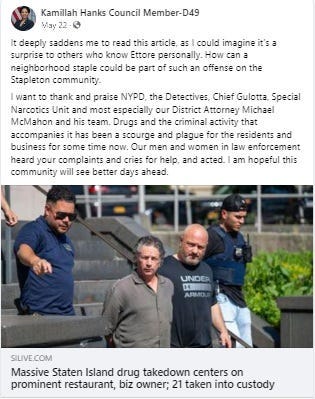
Despite the arrests and growing scrutiny, Hanks has not returned the Mazzei contributions. Critics argue that her silence on the matter suggests a deeper entanglement with the Mazzei family than she is willing to admit.
“Hanks was quick to distance herself from Mazzei after the arrest,” said a source close to Hanks' office who wished to remain anonymous. “But she wasn’t saddened enough to return the drug dealer’s campaign money.”
This controversy is not limited to campaign finance issues. Hanks' long-time partner, Kevin Barry Love, has also been linked to the Mazzeis, specifically as a marijuana connection. Sources confirm that Love regularly purchased pot from Ettore Mazzei, further entangling Hanks in the Mazzei drug operation.

“I know that [Ettore Mazzei] and Love had a connection,” said a local source familiar with their relationship. “Mazzei was numerous times at Hanks and Love’s house on Tappan Court. They smoked pot together on the terrace downstairs.”
Despite attempts to distance herself from the Mazzeis, Hanks faces criticism for refusing to return the campaign contributions. Now tainted by its association with a criminal enterprise, the money has cast a shadow over her political career. With NYC’s robust public financing system, Hanks’ use of matching funds means that drug money played a significant role in her campaign financing.
With the current allegations of narcotics sales and numerous deaths resulting, the case has enough “juice” to “go federal.” That could mean greater scrutiny on Hanks and Love. However, some sources believe that would compromise other cases currently being built.
“Earlier this year, veteran political operative Paul Casali abruptly left Kamillah Hanks’ Council Office, a steady job, and NYCERS time for a spec job on a New Jersey campaign that may or may not lead to something permanent. The reason is Kevin Barry Love,” a NYC Democratic insider said. “[Love] micromanages the Council office and controls access. It’s a recipe for a federal indictment for quid pro quo.”
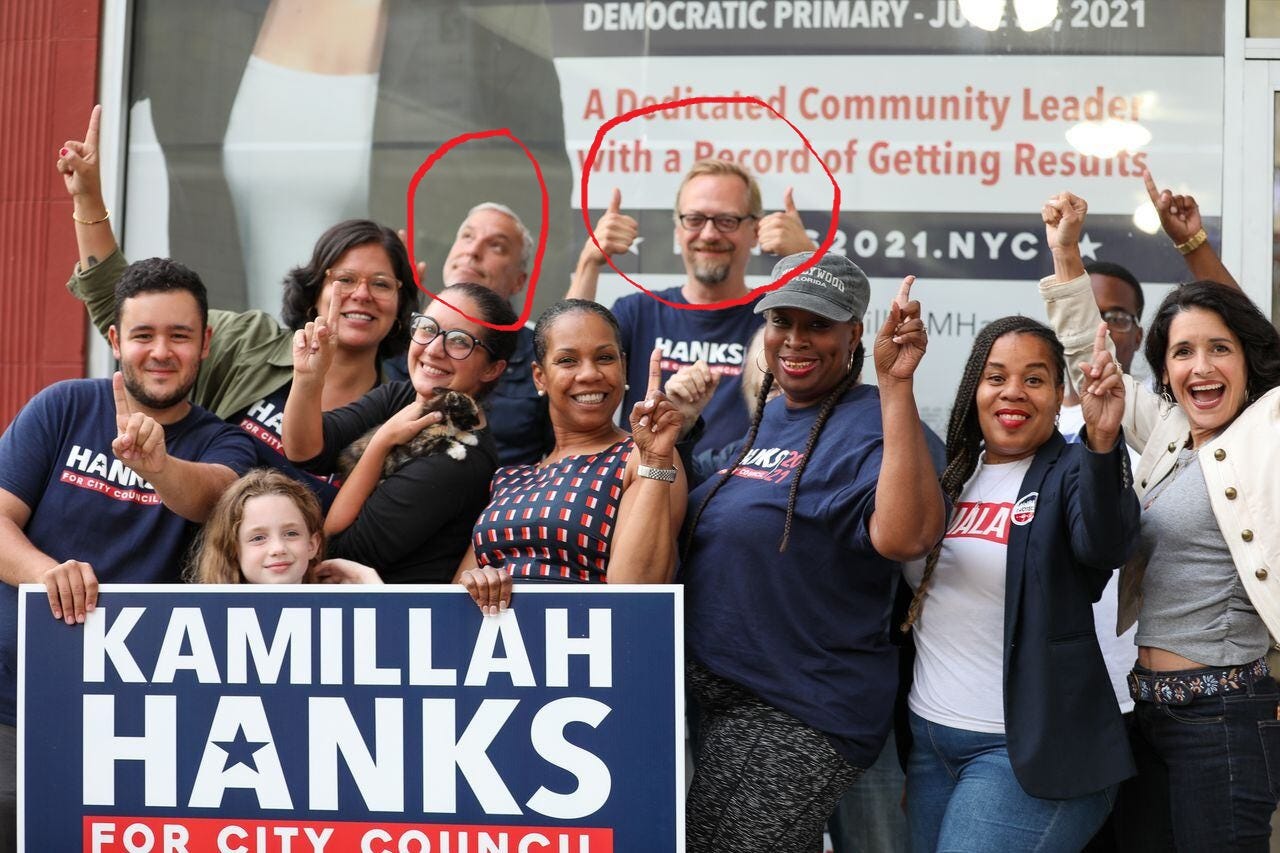
The source said that Casali did not admit federal authorities approached him but that his anxiety was “high” and comfort level “low” with Love’s activities, some of which could be construed as “selling access.” Then again, who publicizes that the Feds approached them? Especially in politics.
“Even [Michael] Arvanites, Hanks’ Communications Director, doesn't advertise his current gig. He’s a Trustee for CUNY and doesn’t mention anything about working for the NYC Council. It’s more than odd,” the source said.
The Deadbeat NYC Council Member
The Mazzei scandal is just the latest in controversies that dogged Hanks throughout her political career. Long-time and respected New York political consultant Michael J. Cox has sworn in a court affidavit that Hanks and Love failed to pay him and other campaign consultants and workers for their labor in her 2017 City Council campaign.
According to Cox, Hanks ensured that her family members were paid in full, some in cash, violating CFB rules, while consultants like Cox were left with unpaid bills.
"I had a handshake engagement with Kamillah Hanks, Kevin Barry Love, and their 2017 campaign for $14,000 to be a political consultant. I was never paid," Cox stated in his affidavit.
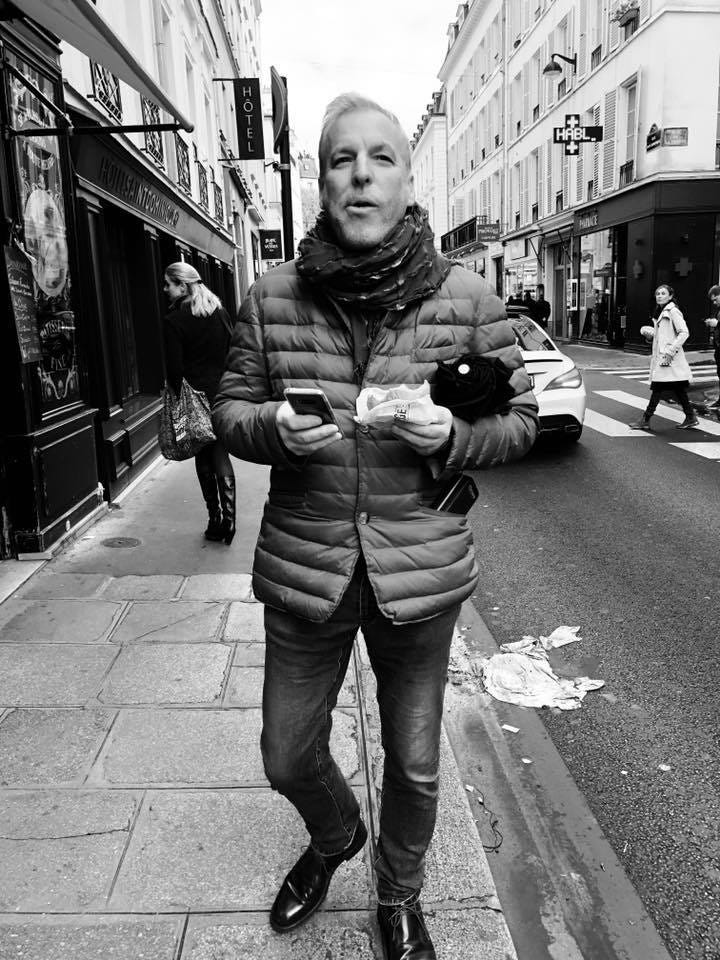
"They had the money to go to Paris, but they didn’t have the money to pay their workers," Cox said, referencing a vacation Hanks and Love took after the campaign.
Cox’s affidavit paints a troubling picture of Hanks and Love as financially irresponsible and politically unethical. They use campaign funds to enrich themselves and their families while ignoring their obligations to their campaign workers.
Cox is not alone; others involved in the campaign have also reported not being paid for their work. Some estimates have Hanks’ failure to pay and report campaign work exceeding $200,000. With the treble damages provision in the NYC Campaign Finance Law, Hanks could be precluded from matching funds until she pays $800,000. Or, she may receive the CFB “death penalty,” previously handed to NYC Mayoral Candidate John Liu in 2013.
Meanwhile, Hanks and Love continue to enjoy the financial rewards of their political $ucce$$.
Bobby Digi / Henry Olisa Charity Money
Another controversy surrounding Hanks involves her connection to Henry "Bobby Digi" Olisa, a controversial Staten Island figure with a history of criminal charges and financial mismanagement.
Olisa has connections to felons and organized crime. His financial history is checkered with bankruptcies and foreclosures. He was also a past president of the Staten Island Democratic Association and a former candidate for the NYS Assembly in 2018.
FBI 302s obtained from a FOIA request show that Digi-Olisa sought funding for a Minthorne Street venture in 2017 from alleged organized crime figures.
HENRY OLISA aka BOBBY DIGI date of birth (DOB) XXXX social security number XXXX cell phone number XXXX address XXXX Staten Island, New York, was interviewed at his hime. Special Agents XXXX of the FEDERAL BUREAU OF INVESTIGATION (FBI) and XXXX of the DEPARTMENT OF COMMERCE conducted the interview. After being advised of the identities of the interviewing Agents and the nature of the interview, DIGI provided the following information:
DIGI first met XXXX in November 2017. At the time DIGI…a British-style pub…The pub, called O’HENRY’S PUBLICK HOUSE is located at 10 Minthorne Street, Staten Island and is still not open.
DIGI is the President of the STATEN ISLAND DEMOCRATIC ASSOCIATION and knows XXXX from the Democratic Party…
This outlet has previously attempted to contact Digi-Olisa to clarify his involvement. Digi was asked whether he would confirm the February 2018 meeting with the FBI and Department of Commerce but has received no response.
The evidence from the FBI 302 is unquestionable. Staten Island, the Staten Island Democratic Association, and a “British Style Pub” that was “still not open” in February 2018 point directly to Digi-Olisa and no one else.
According to Office of Court Administration documents previously obtained by The NY Post, Digi-Olisa was arrested at least ten times between 2000 and 2014. He has faced 23 charges, including menacing, criminal possession of a weapon, harassment, attempted assault, and driving without a license. Most charges were dismissed or resulted in pleas to lesser crimes, yet the details remain largely sealed, adding to the ambiguity surrounding his legal history. Attorney and former prosecutor Mark Macron represented him in many matters.
Digi-Olisa also previously faced allegations of landlord misconduct, including ignoring building violations and failing to pay fines. His property management on Broad St., Water St., and Brook St. were criticized for numerous violations, including illegal apartments and unsafe conditions. Charges of domestic abuse against him were also dismissed.
Digi-Olisa has a child with NYC Commissioner of Cultural Affairs Laurie Cumbo. In 2022, the relationship garnered significant attention with Digi-Olisa's extravagant proposal to Cumbo at the Met Gala. The grand gesture, set against a $50,000-a-ticket event backdrop, raised eyebrows about how the couple afforded such luxury.

This high-profile display of affluence sparked questions, considering Digi-Olisa's troubled financial past and Cumbo's position as a critical figure in Mayor Eric Adams' administration.
Where did all the money come from?
They asked the same question about Ettore Mattei - until very recently.
Digi’s nonprofit, Canvas Institute, has received over $100,000 in public funds allocated by Hanks, raising concerns about cronyism and the misuse of taxpayer money.
"Taxpayer funds support the Canvas Institute, Digi-Olisa’s new hustle," reads an investigative report highlighting the questionable allocation of public funds to Olisa’s organization.

Digi-Olisa has been a charitable executive with Island Voice, Inc. since its formation in 2006. He failed to file any tax or reporting forms with state and federal regulators, meaning the IRS, the NYS Department of Revenue, and the NYS Attorney General’s Office. These tax returns and reports are open to public inspection.
The tax return that goes to the IRS is a Form 990. Just like personal tax returns, Form 990s must be filed annually. Their due date is May 15, a month later than individual returns. The IRS’s website says Island Voice, Inc.’s charitable status was revoked in May 2010 because the organization failed to file three consecutive 990 charitable tax returns. That means Digi-Olisa NEVER filed a tax return for that not-for-profit entity.
NYC Council Member Kamillah Hanks has already identified $105,000 of funds as coming from NYC Department of Cultural Affairs money, where Digi-Olisa is literally “in bed” with the boss.
The allocation of significant public funds to his nonprofit has led to calls for an audit of Digi-Olisa's and the Canvas Institute’s finances and a closer examination of the relationships between Digi-Olisa, Cumbo, Hanks, and their respective public offices and charities. Why nothing has occurred adds to the opinion that Digi-Olisa enjoys a “halo” as a politically connected Federal Informant.
Many question whether Digi-Olisa is a federal informant or a “Rat,” as the term is used in the street. Olisa’s connection to Hanks has raised red flags, particularly given his ties to the Mazzei family and other criminal activities. His involvement in Staten Island’s political scene has only deepened suspicions about Hanks' judgment and her choice of associates.
Hanks Supports Cop-Killer and Gang-Banger Groupies
The final blow to Hanks’ already damaged reputation comes from her support of the True2Life organization. This group advocates for the parole of convicted criminals, including Shatiek Johnson, who murdered NYPD Officer Gerard Carter in 1998.
The Gerard Carter Community Center in Stapleton opened in 2011 and is a monument to Carter’s life and service. However, the recent decision to involve True2Life in the center’s programming threatens to overshadow the hero officer’s legacy.
True2Life is part of the New York City Crisis Management System, aiming to reduce violence through a public health approach. The organization treats violence as a learned behavior that can be mitigated using disease control methods.
Hanks has been a strong supporter of True2Life despite its controversial affiliations. Last year, the group’s principals, Malcolm Penn and Mike Perry, publicly supported Johnson’s parole, which was ultimately denied.
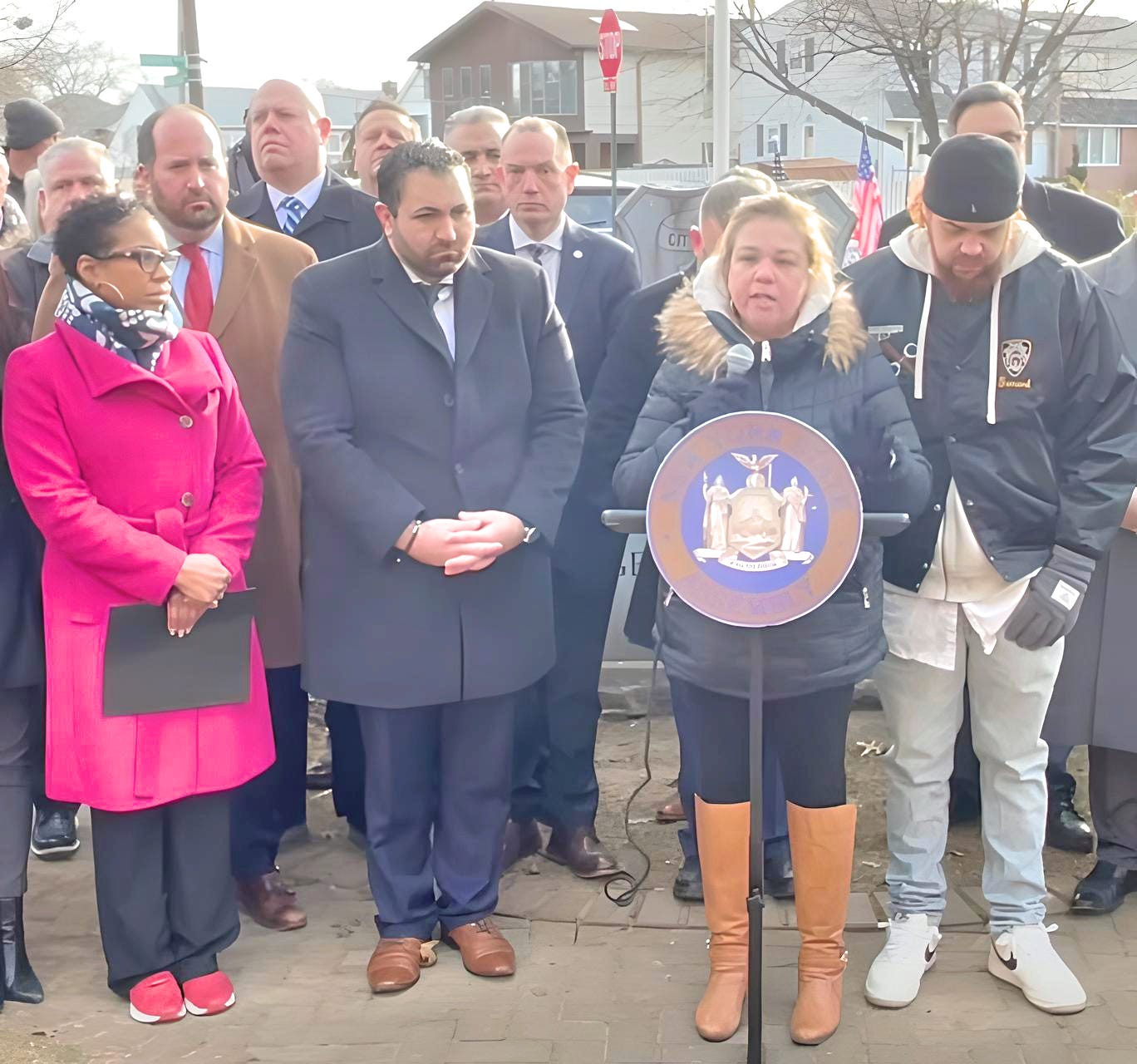
NYPD widow Jozette Carter-Williams, the wife of Officer Carter, has expressed her outrage at Hanks’ support for True2Life.
"I am incensed at the sentiments of the current councilmember and her selected associates, the True2Life Organization, which is anti-police and anti-NYPD and their families," Carter-Williams said. "Gerard would not want children and families being taught anti-police hatred in a place that bears his name.
However, True2Life has faced criticism not only for its parole advocacy for cop killers but also for its controversial affiliations. Malcolm Penn, one of its principals, previously supported John Pena, a former gang member released from prison after 15 years. Pena was soon after arrested by the Federal authorities for his involvement in three gang-related murders. He remains in federal custody at the Brooklyn Metropolitan Detention Center awaiting trial.

The indictment against Pena, known as “Tragedy” or “Money Baggz,” details his leadership of the Gorilla Stone Mafia, a subgroup of the Bloods street gang. The charges include murder, firearm offenses, and drug trafficking. Pena allegedly murdered a rival gang member, Mark Bajandas, in a brazen public shooting.
Breon Peace, the United States Attorney for the Eastern District of New York, emphasized the gravity of the charges.
“As alleged, the defendant, a leader of a violent street gang, unleashed a barrage of gunfire on a public street, killing the victim and placing our community in grave danger,” he said.
Peace added that the prosecution aims to neutralize the threat posed by gang members like Pena. FBI Assistant Director-in-Charge Michael J. Driscoll echoed these sentiments, highlighting the lack of respect for human life demonstrated by gang violence.
“The elimination of violent street gangs is an absolute precondition to the sustainable prosperity and justice that New Yorkers deserve,” added the former NYPD Commissioner at the time of the Pena arrest.
Police Union Denounces NYC Council Member Hanks
Hanks has also lost law enforcement. The NYPD Sergeants Benevolent Association (SBA), led by President Vincent Vallelong, publicly condemned Staten Island Councilwoman Kamillah Hanks for her anti-cop voting record, including her affirmative vote on the divisive "How Many Stops Act." The bill purportedly mandates tracking of investigative interactions with the public. While proponents label it police transparency, the new NYC law has stirred significant controversy.
Vallelong lambasted Hanks, stating, "She sold herself as pro-law enforcement for endorsements, but her vote exposes a lack of truthfulness and transparency. As Public Safety Committee Chair, her support of this idiotic bill demonstrates ignorance of police work and disregard for public safety."
Councilwoman Hanks, re-elected in November with previous SBA support, faces a significant break in her relationship with law enforcement. Along with the SBA, the PBA, the DEA, and the DEA have also turned their backs on the once-promising politician.
Hanks defended her decision and emphasized the need to balance police workload with community concerns.
"This reporting bill is for the hardworking families in high-violence neighborhoods, balancing their safety and enforcement experiences," she explained.
NYC Public Advocate Jumaane Williams spearheaded the bill, which narrowly evaded Mayor Eric Adams' veto potential with a 35-member Council majority. However, conservative NYC Council members like Joseph Borelli and David Carr opposed it, citing increased bureaucracy.
The law requires detailed quarterly NYPD reports on investigative encounters, including demographic data and officers' actions. Vallelong criticized Hanks for not supporting law enforcement at this crucial juncture, questioning her integrity and commitment to her constituents' safety.
Despite her past support from NYPD unions, Hanks' voting record raises questions about its impact on her 2025 re-election campaign. She remains resolute, expressing a desire to balance transparency with effective policing.
"My decision reflects the complexity of ensuring transparency and effective policing, a view my retired NYPD Sergeant grandfather would have shared," Hanks said.
However, an NYC political consultant who did not wish to be named said Hanks should be very concerned.
“Once you lose the police unions, they never come back. And it’s near impossible to carry a district on Staten Island if you’re perceived as anti-cop,” the consultant said.
NYC Council, SI Dems Demotions
After the How Many Stops Act debacle, Hanks was demoted as Chair of the NYC Council Public Safety Committee. She is one of two NYC Democrats who does not chair a council committee. This was on the explicit orders of NYC Mayor Eric Adams and NYC Council Speaker Adrianne Adams.
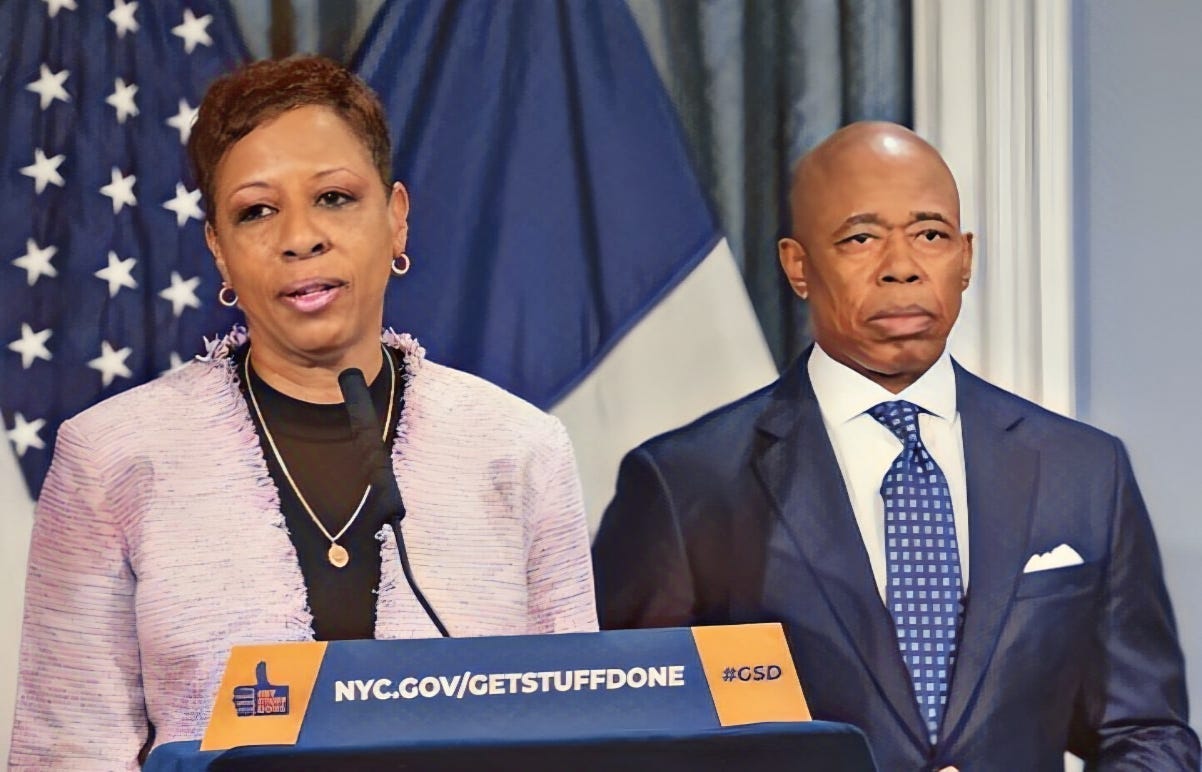
"Both Adamses have previously distanced themselves from popular politicians for much less. Diana Reyna comes to mind,” a prominent Manhattan Democratic consultant said. “The claim that this is a 'reshuffle' is unadulterated bullshit. This is both punishment and practicality. Hanks isn't very popular. They both look at her, and all they see are headaches."
Hanks, however, downplayed the significance of her demotion, framing it as a divergence in vision with party leadership. She remains committed to representing her constituents.
Additionally, Hanks' standing within her district in Staten Island has been deteriorating. The Staten Island Democratic Party Chair, Laura Sword, is reportedly not on speaking terms with Hanks. A 2025 primary challenge is expected, and the county organization might not support her.
Hanks’ stance on police matters is particularly problematic in Staten Island, known for its law enforcement support.
A member of the Staten Island Democratic County Committee highlighted Hanks' history of alienating colleagues, referring to her past conflicts and a perceived lack of loyalty.
“She’s not well-liked. I have nothing nice to say. So, I won’t say anything else,” said a long-time county committee member who confirmed she was a Debi Rose supporter in 2017 and “will always be one.”
Is Kamillah Hanks Done?
Hanks’ political career, once promising, is now at serious risk. Her association with the Mazzei family, financial misconduct allegations from Cox and others, ties to questionable figures like Olisa, outright abandonment by the law enforcement unions, NYC Democratic Party leadership, and her county committee, and support for controversial organizations like True2Life have eroded her standing in the community.
The public’s trust in Hanks is waning, and as the 2025 election approaches, many Staten Island voters are beginning to question whether she is the right person to represent them. Her failure to address the allegations and return the tainted campaign contributions could prove her undoing.
With federal investigations potentially looming, the full extent of Hanks’ involvement in these matters may soon become clear.
For now, the people of Staten Island are left to wonder: How much longer can Kamillah Hanks survive in New York City politics? The voters will have the final say in 2025.


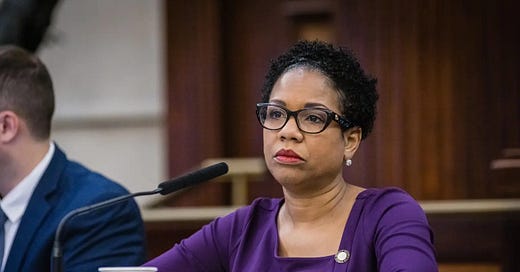






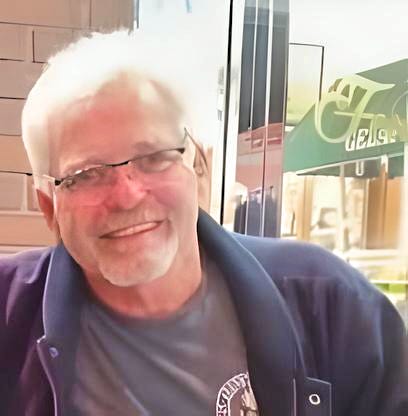
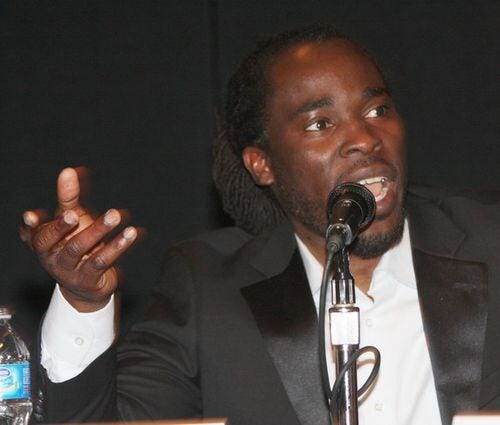
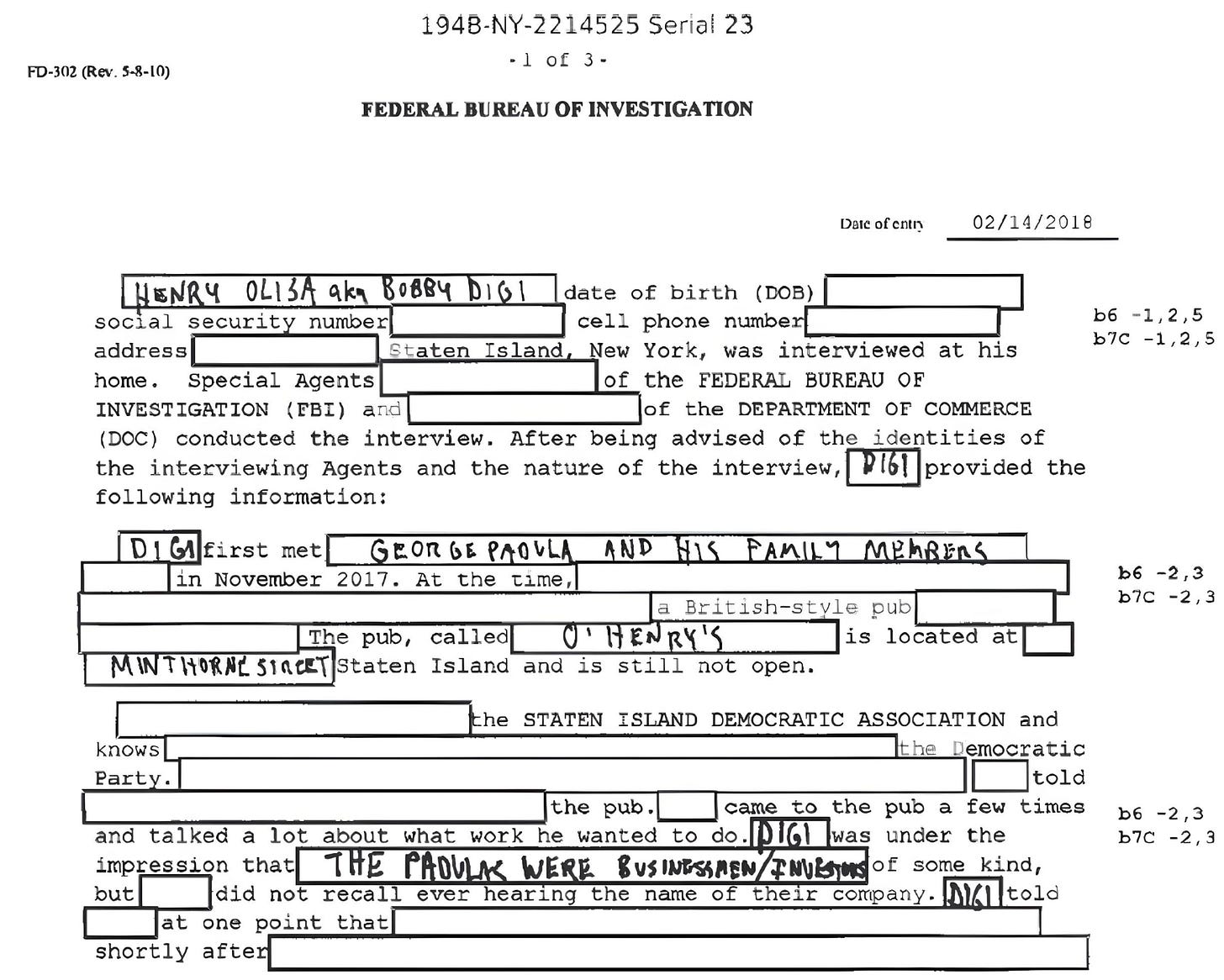
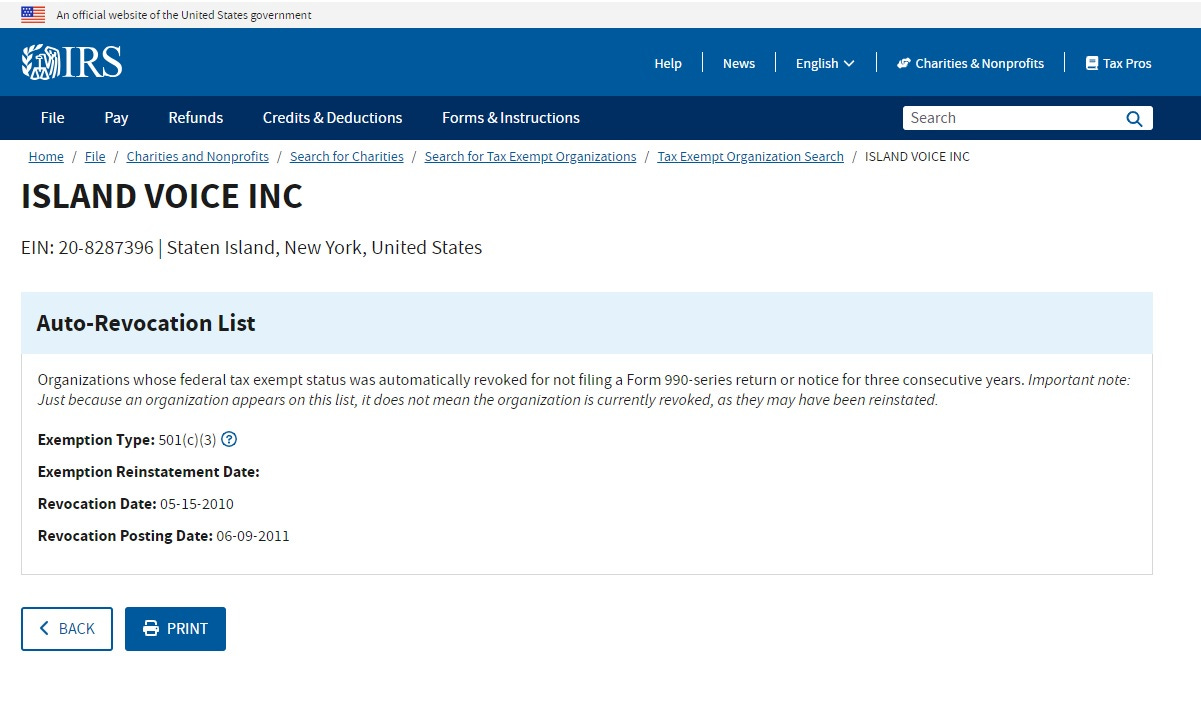

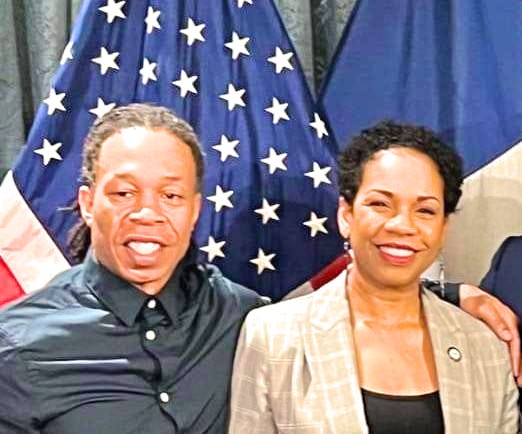

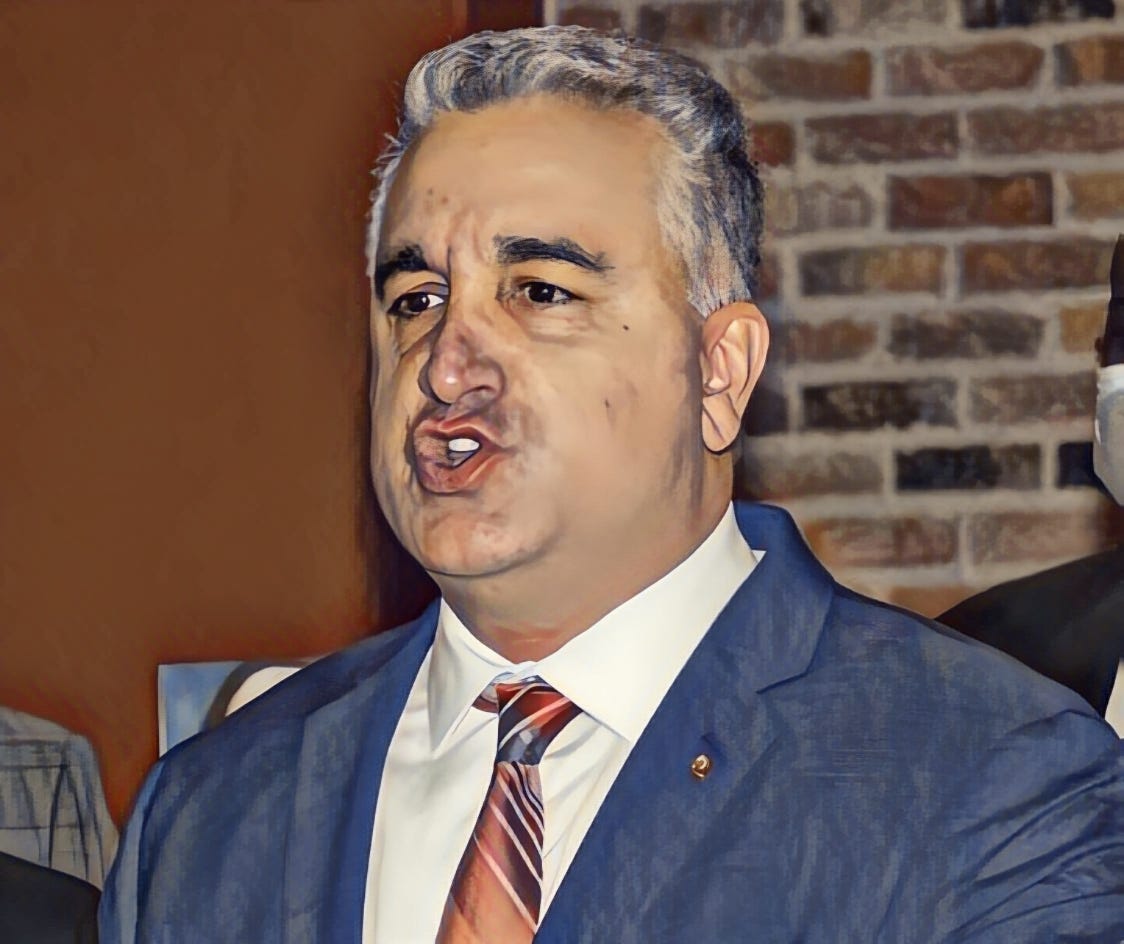
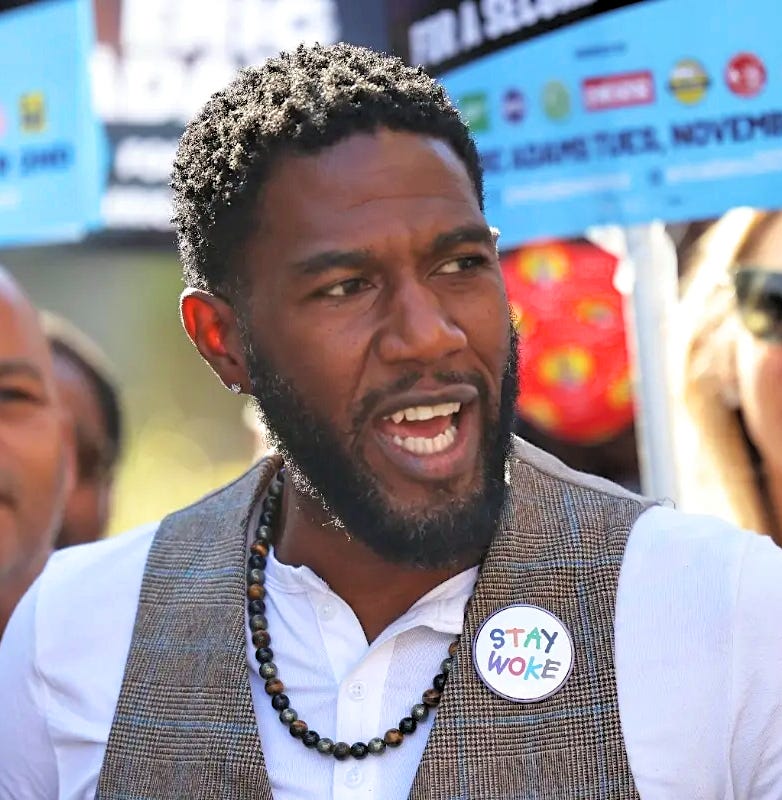












Share this post